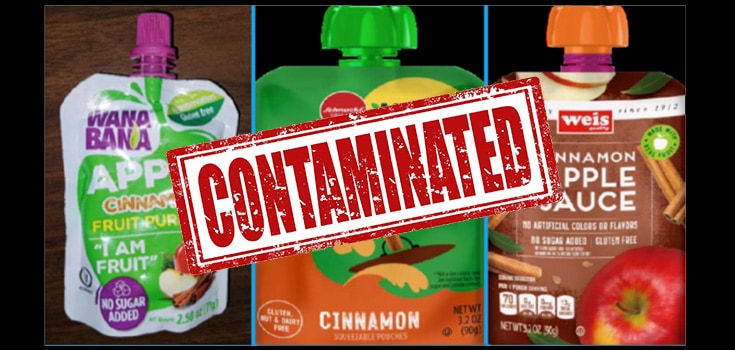FDA: Children’s Applesauce PURPOSELY Contaminated with Heavy Metals

The U.S. Food and Drug Administration verified that lead chromate, a compound containing lead and chromium, is the contaminant found in specific brands of cinnamon applesauce intended for children, which were imported from Ecuador. Shockingly, the health organization thinks the contamination was not accidental but deliberate.
Previously, the FDA had identified alarmingly high levels of lead in the applesauce samples, with concentrations up to 2,000 times above the safe limit. As a result, in November 2023, recalls were issued for three brands of the contaminated cinnamon applesauce: Wanabana, Schnucks, and Weis.
“People who ate recalled products, especially if they had elevated blood lead levels, may have been exposed to chromium and should inform their healthcare provider so they can monitor health and provide supportive care, as needed,” according to the FDA’s Feb. 29 update.
The FDA advises individuals who have consumed the recalled products, particularly those who have shown elevated blood lead levels, to seek medical advice. This will enable healthcare providers to monitor their health closely and offer necessary support.
The practice of adding lead chromate to spices, to enhance their weight and color for financial gain, is not new and is considered illegal. The FDA suspects that this incident of contamination might be a case of economically motivated adulteration.
“Historically, lead chromate has been illegally added to certain spices to increase their weight and color, increasing the monetary value of the adulterated spices. FDA’s leading hypothesis remains that this was likely an act of economically motivated adulteration.”
Ecuador’s health regulatory agency, ARCSA, has identified Carlos Aguilera as the probable source of the contamination. Currently, Aguilera’s operations have been halted.
Related Read: 6 Chelating Foods to Remove Heavy Metals
Regulatory challenges arise as the FDA has limited authority over foreign suppliers who do not ship their products directly to the U.S. This limitation affects the FDA’s ability to take direct action against Negasmart, the supplier of the cinnamon, and Carlos Aguilera, the processor of the cinnamon sticks used by the Ecuadorean applesauce manufacturer, Austrofoods.
The Centers for Disease Control and Prevention (CDC) reports an increase in affected individuals, with 468 patients across 44 states, up from 422 in the previous report. The FDA has recorded 90 children experiencing adverse reactions, though there may be some overlap between the CDC and FDA figures.
The FDA reassures that this contamination issue seems isolated to the recalled products, with no confirmed reports of illness or adverse events related to other cinnamon-containing products or cinnamon itself.
Investigations into the source of the cinnamon sticks used in the recalled products pointed to Sri Lanka. However, tests conducted by Ecuadorean officials on these unprocessed cinnamon sticks found no lead contamination.
A joint investigation by The New York Times and the non-profit organization “The Examination” revealed that the contaminated applesauce and cinnamon bypassed several safety checks meant to protect the U.S. food supply.
Records indicate that Austrofood was not mandated to test for toxic metals and did not conduct such tests.
Additionally, the FDA’s border food inspections have decreased by half compared to a decade ago, allowing the contaminated applesauce to enter the U.S. market.
For parents and caregivers concerned about potential exposure to the contaminated applesauce, it’s advised to opt for blood tests. Symptoms of lead exposure can range from immediate effects like headaches, abdominal pain, and vomiting to long-term consequences including irritability, muscle aches, and even developmental delays and brain damage in severe cases.
